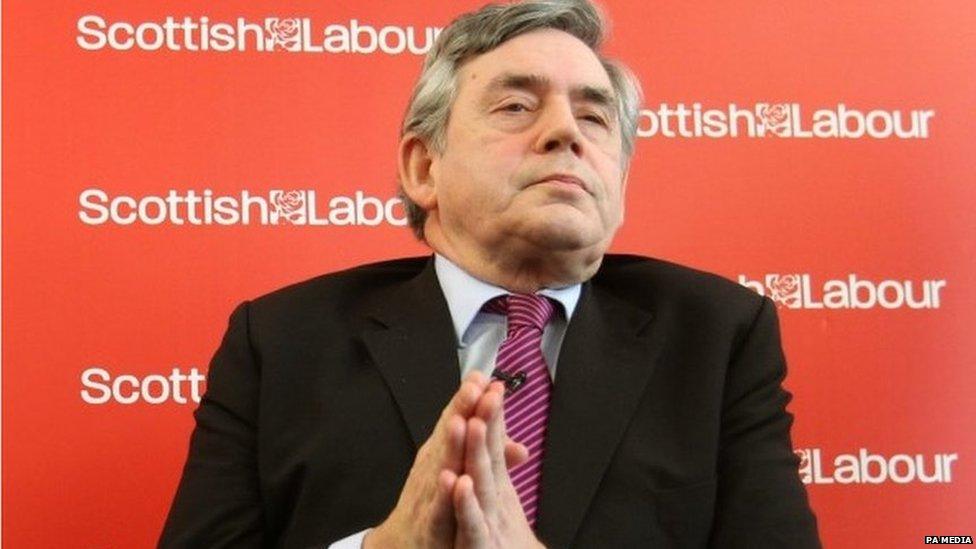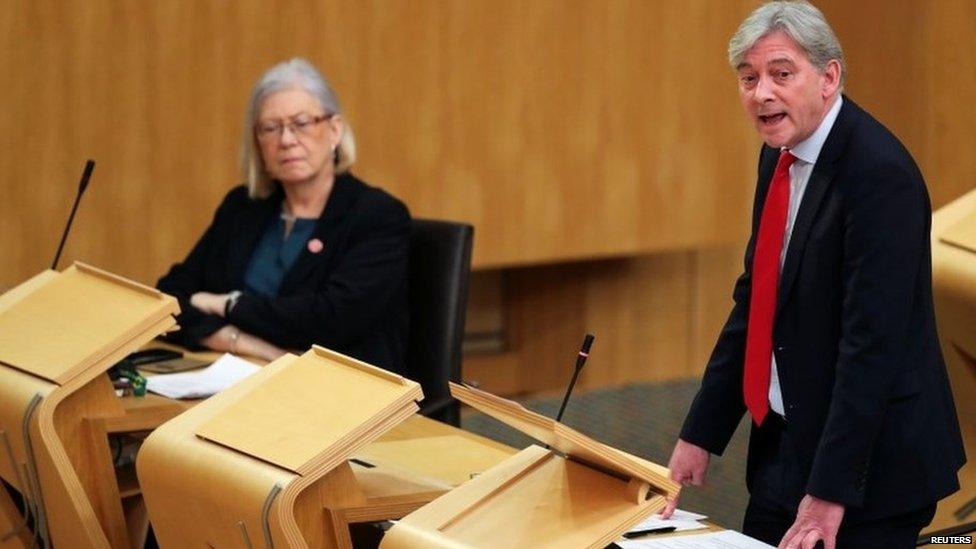Labour and Scotland: Can Keir Starmer save the United Kingdom?
- Published

The coronavirus pandemic has put devolution in the spotlight like never before.
In Scotland, Wales and Northern Ireland, life and death decisions are being made by the devolved governments. Elected mayors across England have seen their public profile rise significantly.
But what does it mean for the future of the UK?
Sir Keir Starmer's promise to devolve more power out of London - to the most local level - is Labour's attempt at providing an answer.
The Labour leader announced a constitutional commission to look at what powers should go where - and the former prime minister Gordon Brown, himself long an advocate of a federal system with more power for nations and regions, is going to advise it.
Sir Keir told me he was prepared to make decisions that would be uncomfortable in Westminster and which would result in power being taken out of London to other parts of the UK.
Devolution is pretty straightforward when national and devolved leaders agree. When they don't, it becomes a lot harder.
Nowhere has that been more obvious than in Scotland - and his speech was Sir Keir's first major foray into the independence debate.
'No man's land'
For years, many believe Labour in Scotland has been in a constitutional no man's land; stuck between the pro-independence SNP and the strongly unionist Conservatives.
Labour has flirted with different positions - and has taken a hammering at the polls as a result. I've written about the dilemma before.
Today's speech was intended to give more clarity on exactly where Sir Keir stands ahead of May's Holyrood election. He has adopted a similar position to the UK government on calls for another independence vote; not now, but not quite ruling it out forever.
Labour is open to more powers for Holyrood, presents itself as the party which introduced devolution in the first place, and will oppose what it sees as attacks on devolution from the current UK government.

Ex-PM Gordon Brown's belief in a more federal Britain is well documented
Not everyone is impressed, however.
Just as Sir Keir finished his speech, a former senior figure in the Labour Party, who has grappled with the issue before, texted me saying: "The whole thing is so dull and tired".
Why? Well, Labour has been talking about more devolution - or federalism - for some time. It was Jeremy Corbyn's answer to the independence debate.
Gordon Brown has talked about it for years, including in the 2014 independence referendum. There's a video on YouTube of the former prime minister in Cardiff in 2017 launching… a Labour constitutional convention.
Some may have a bit of a sense of déjà vu today.
It might also sound like a bit of a fudge; Labour is going to look at moving more power away from London without actually promising anything specific.
'Joined-up approach'
There are, however, a couple of things the Labour Party under Sir Keir is hoping will change the debate and get Labour back on the pitch.
The first is that it reflects joined-up thinking.
Over the last couple of weeks, we've heard a number of elected Labour politicians - Welsh First Minister Mark Drakeford, Scottish Labour leader Richard Leonard, and a series of directly elected mayors including London's Sadiq Khan and Manchester's Andy Burnham calling for considerably more devolution, saying it's the way to save the union.

Polling suggests some unionists rate Nicola Sturgeon more highly than Boris Johnson
Scottish Labour and the UK party now seem to be on the same page, although some in Scottish Labour believe it would be wrong to say no to indyref2 if the SNP wins big in May's election.
When Jeremy Corbyn was leader, that wasn't always the case and one of the frustrations you often heard was that the Scottish party felt it was often cleaning up after Mr Corbyn.
Sir Keir's team hope the party, in its various forms across the UK, can now unite behind this position.
The second is based on polling. Unionists believe one of the reasons support for Scottish independence appears to be going up is because of the contrast between Boris Johnson and Nicola Sturgeon.
The argument goes: Scots might not always be happy with the decisions made by the Scottish Government during the pandemic, but they are happy the first minister is making them and not the prime minister.
Even senior Scottish Tories accept the prime minister is unpopular among voters who could change their mind on the constitutional question.
'Leadership contrast'
Although Sir Keir's leadership is unlikely to mean Labour returns to its previous standing in Scotland, the hope some influential unionist figures have is that the contrast between Ms Sturgeon and Sir Keir won't be as stark and that could help the unionist cause, if he looks like a potential prime minister.
There's a lot to this that we will revisit before the Holyrood election.

Richard Leonard's performance as Scottish Labour leader has come in for criticism
Some are deeply unimpressed with Scottish Labour leader Richard Leonard - it was interesting Sir Keir dodged a question on what Mr Leonard's biggest achievement was - while some speculate that a more public role for Gordon Brown might be a way of addressing the low profile of Mr Leonard.
The SNP would also point out that while Sir Keir is advocating more devolution - he is not when it comes to Holyrood deciding on another independence vote.
And there are also nuances in Wales and different English regions which can't all be covered with a catch-all policy.
But Labour is trying to come up with a solution and has tried today to move the debate on. Many in the party believe if things don't change - the union could be finished.